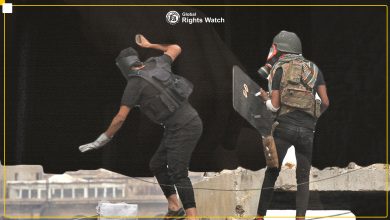Violations against Prisoners in Evin Prison in Iran
Recently, information about abuses against prisoners in Iran was leaked. Video recordings of guards beating prisoners were leaked and reports of multiple cases of abuse in women’s prisons went viral on social media.
Evin Prison is a torture center for thousands of political prisoners, with several underground interrogation rooms.
Detainees are regularly tortured to sign confessions, according to Amnesty International’s report. The women’s section of this prison witnesses many daily violations including torture and inhuman treatment, and a visit ban, according to AI report.
Until recently, the prison was known to be a place of torture for the whole world. Following the unprecedented protests in Iran, the prison became full of detainees who were subjected to torture. The survivors’ accounts exposed severe violations in Evin prison, a prominent hotbed of torture.
A group calling itself “Imam Ali’s Justice” circulated social media footage captured by security surveillance cameras, showing guards beating prisoners and dragging one on the ground.
For almost two decades, the authorities prevented independent observers from visiting Iranian prisons and brought to trial prisoners who reported being subjected to torture.
In a tweet posted by official media, the head of the prison service said: “With regard to the images of Evin’s Prisom, I take responsibility for this unacceptable behavior and pledge to work to prevent the recurrence of these bitter events and to deal with perpetrators.”
This was a rare recognition of human rights violations in Iran, which has consistently rejected criticism of its human rights record and described it as unfounded allegations.
One of death case described as “suspicious”, by Amnesty International, was that of Shaheen Nasri, who died after being transferred from a prison in Tehran to an unknown location. Nasri testified as a witness to the torture of the well-known boxer and opposition Naveed Akkari, whose execution in September 2020 triggered a wave of global outrage. Afkari complained before his death, about being tortured for a confession, including beating and pouring alcohol into his nose.
Golian, a prisoner from Ahwaz, described the place of detention as a “site at the end of the world” and a “forgotten hell,” the brutality of which is “beyond imagination.”, adding that female prisoners were forced to provide sexual services to guards, and one prisoner had been forced to undress while calling names as punishment. Golian prepared a book on her prison experiences and torture, published by Iran Wire from its headquarters in London in Persian and English languages.
United Nations position’s towards Iran’s violations against prisoners of conscience and political prisoners
The United Nations High Commissioner for Human Rights, Michel Bachleh, has stressed that demonstrators, civil society activists, lawyers and human rights activists in Iran are subjected to intimidation, threats, arbitrary arrest and trial, including execution. The recent report on the human rights situation in Iran submitted to the Secretary-General of the United Nations showed the appalling violations of human rights.
The United Nations High Commissioner for Human Rights said: “At least 267 people were executed in Iran in 2020, of which only 91 were reported. In 2021, 95 people have been executed so far. More than 80 children are on death row in Iran, of whom 4 are at imminent risk of execution.
In a rare step in early March, in the context of drawing attention to recent incidents that have sparked international and rights criticism, including the death of a prisoner under psychological and physical torture which was registered as a suicide, Iran pardoned or eased the provisions of 1,800 prisoners last March on the anniversary of the birth of Imam al-Mahdi, and in a rare step which included the release of 100 convicted prisoners.
Although amnesty may be an important and rare step in a country that is internationally identified as the world’s worst country in terms of violation of human rights, we cannot forget the practices and serious violations in its notorious prisons, where torture, killing, solitary isolation and deprivation of sleep, are often the methods used against prisoners of conscience and political prisoners.
Iran must drop all charges against prisoners reporting violations, allow victims of human rights violations to file complaints, and allow an impartial committee of lawyers to investigate the treatment of prisoners by allowing them to visit Evin prison and review the full videos.






